Annex B: 2017 un peacekeeping defence ministerial: vancouver communiqué
Table of contents
Objectives of the ministerial
UN Peacekeeping Defence Ministerial report
Annex A - List of participants
Annex B - 2017 UN peacekeeping defence ministerial: Vancouver communiqué
Annex C - Vancouver principles on peacekeeping and the prevention of the recruitment and use of child soldiers
From 14-15 November 2017, delegations from 80 countries met in Vancouver, Canada, to re-affirm their commitment to United Nations peacekeeping.
For over sixty years, UN peacekeeping has served as the standard bearer of the world’s shared commitment to international peace and security, proving to be one of the most effective tools available to assist host countries and their populations, in navigating the difficult path from conflict to peace.
We salute the brave women and men who serve in peacekeeping operations around the world, and pay tribute to those who have made the ultimate sacrifice in the pursuit of peace.
As these operations grow in complexity, the UN too must evolve; not just to keep pace, but to anticipate, to adapt, and to respond – differently and better – to the challenges before us. As Members of the United Nations, whether as host nations or as troop, police, financial, or equipment contributors, we have an essential role in this evolution. We recognise that ours can only be a shared success, achieved in partnership with the UN Secretariat, regional organisations, and with each other.
Moving forward in un peacekeeping: working differently and better, together
To this end, we must work together to reform our shared institutions, enhance operational effectiveness, and to make a sustained and collective effort to address capability gaps in UN peacekeeping. It also requires us to integrate gender perspectives in defining and delivering these capabilities, if we are to truly do things differently and better.
We are therefore encouraged by the Secretary-General’s efforts to pursue comprehensive reform in the areas of management, development, peace and security, and gender. We take note of the 2015 Peace Operations Review1, and the complementary focus of these processes in orienting UN peacekeeping towards a greater field-focus, and in placing people at the centre of our efforts. The UN must evolve to better address critical challenges in the design, planning, resourcing, execution and oversight of peacekeeping operations.
We welcome the new pledges made by 49 delegations at the Vancouver Ministerial, and the progress these pledging conferences have achieved in meeting persistent capability gaps and improving the performance and capabilities of uniformed and civilian personnel. As a result of collective efforts— planning, pledges, performance, together with the primacy of politics and partnerships — have come to underpin our approach to strategic force generation and are integral to the success of UN peacekeeping.
As we continue to improve strategic force generation, we must broaden our planning horizons, moving beyond short-term operational gaps or troop and police ceilings as drivers for capability discussions; systematically and transparently build longer-term solutions for force generation, including through better data-driven mission analytics; and proactively address gender, police and francophone capacities, which remain in short supply and are important to the success of UN peacekeeping. We should also consider, from the start, exit strategies for peacekeeping operations.
In line with these objectives, in Vancouver, we identified concrete ways to move forward in UN peacekeeping, working differently and better, together, by:
- Re-affirming our commitment to UN peacekeeping, through the next generation of smart pledges;
- Improving our ability to deliver on this commitment, through innovations in training and capacity-building;
- Aligning our corresponding capabilities to where they are most needed in the field, through concerted and integrated strategies in order to protect those most at risk, and
- Enhancing the effectiveness of how we deliver these capabilities, through improved approaches to partnering and planning in early warning and rapid deployment.
We further affirmed that integrating gender perspectives, increased knowledge of local language and culture, including the continuing need to focus on operating in francophone environments, and strengthening UN Police are key to the long-term success of these objectives.

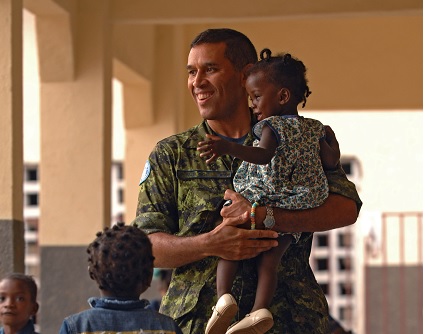
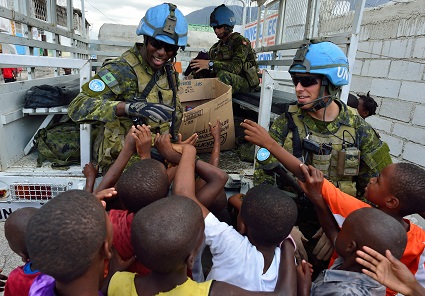
Smart pledges
First and foremost, we affirmed the necessity of moving beyond traditional models of pledging and deploying to consider ways that multiple countries could share the burden of providing the capabilities that are in highest demand. Smart pledges serve as an enabler in their own right and provide the predictability of supply that is needed to enhance a mission’s chance of long-term success. We encourage Member States to identify where they can jointly implement smart pledges and commend initiatives underway, such as efforts amongst Member States and the UN Secretariat to establish rotation plans for military transport aircraft in the UN Multidimensional Integrated Stabilisation Mission in Mali.
From the very beginning, strategic force generation pushes us to consider the capabilities that are needed to fulfil mandates and ensure the safety and security of United Nations personnel in the field. Smart pledges are a means of meeting the most critical capability gaps in UN peacekeeping, particularly in areas such as aviation, engineering, and medical.
In this regard, we encourage the UN Secretariat to work closely with Member States, and particularly troop, police, financial and equipment contributing countries, to strengthen the capabilities of UN peacekeeping missions. We reiterate our call for the Secretary-General to ensure that the UN – in particular those offices overseeing peacekeeping, field support and management – has the systems in place to deploy, absorb and sustain newly pledged assets rapidly and in accordance with the specific needs of individual missions, including in areas as airlift, rapid engineering support, force headquarters and police and civilian recruitment.
Effective mandate implementation also requires sustained focus on addressing chronic gaps in relation to policing, francophone and gender capacities. These capacities are critical to mission objectives, maintaining meaningful dialogue with local populations, as well as helping to build the foundation for host nation success.
We further recognise that greater women’s participation in peacekeeping is directly linked to improved operational effectiveness. Women’s participation broadens the skills and capacities among all categories of personnel and improves the mission’s image, accessibility, and credibility vis-à-vis the local population. We therefore call on Member States to realise commitments made at the London UN Peacekeeping Ministerial Conference to double the number of female peacekeepers in missions by 2020, including deploying, at minimum, 15% (military staff officers and observers) and 20% (police) female personnel. We welcome the launch of the Women, Peace and Security Chiefs of Defence Network, which will contribute to these goals, and encourage Member States to appoint Champions and join the network.
We acknowledge that in order to address structural barriers preventing the full involvement of women in national militaries and UN peacekeeping, these objectives should be backed by targeted female recruitment, training, and promotion initiatives; retention strategies; reviews of restrictions on military ccupations; regular reporting on the proportion of female and male participation; and implementation of gender-responsive budgeting tools. We further note the importance of empowering women peacekeepers in order to ensure their equal access to relevant senior leadership positions.
Innovation in training and capacity building
Second, we called for a renewed global training partnership for UN peacekeeping and we encouraged Member State pledges for peacekeeping capacity-building. The complexities of today’s operations require coordinated and cross-cutting action to enhance the equipping and training of peacekeepers, including UN police. Notwithstanding that troop and police contributing countries remain responsible for the delivery of training, Member States, regional organisations, and the UN Secretariat bring a collective wealth of knowledge and experience that is unparalleled to that of any single effort. Thus, we encourage this renewed relationship to be built on sustainable training and capacity building and peer-to-peer learning, supported by expanded triangular partnerships between donors, troop and police contributing countries and the UN Secretariat. This would include frameworks driven by long-term force and police generation needs, informed by data-driven performance assessments, and ensuring continuity between peacekeepers receiving equipment and training and those being deployed.
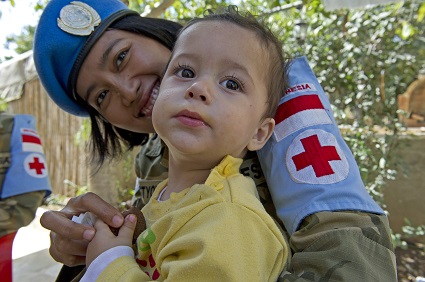
We welcome the development of the train-the-trainer centre in Entebbe and encourage greater innovative practices such as the use of mobile training teams. Similarly, in recognising the value of training and support for mission leadership, we further welcome the move towards in-mission scenario-based training and leadership partnering initiatives.
We acknowledge the need to strengthen pre-deployment training for UN police, including through the use of the Strategic Guidance Framework as the basis for operational guidance and training tools to ensure coherence across all police-contributing countries.
We further acknowledge that a number of large-scale UN peacekeeping operations are taking place in francophone environments. We must continue to address linguistic gaps and enhance operational capabilities in all missions, including those in francophone areas, by leveraging innovative partnership opportunities. We therefore welcome the Ministerial Conference on Peacekeeping in the Francophone Area convened in Paris (October 2016), appreciate the support of the Organisation internationale de la Francophonie, and encourage follow-on initiatives to build the capacity of francophone partners to deploy in UN peacekeeping missions.
We also encourage continued efforts to evaluate and improve contingent performance. We agree that high performing peacekeepers are critical to mission success. We strongly emphasise the role of Member States in ensuring operational readiness and certification of their peacekeepers. We recognise the need for the UN to engage earlier and more consistently with troop and police contributing countries in order to identify training gaps and remediation mechanisms to address these gaps where possible
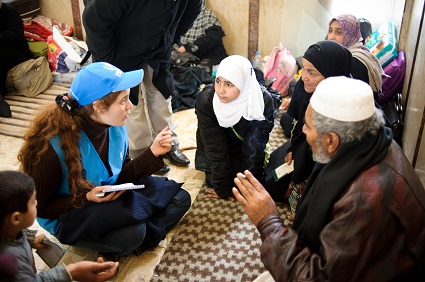
Protecting those at risk
Third, we underlined that protecting those at risk lies at the heart of modern-day multi-dimensional UN peacekeeping operations. For two decades, the international community has turned to the UN and regional peace operations to respond to conflicts marked by egregious violence toward civilian populations. Today, more than 95% of UN peacekeeping personnel serve in missions with a protection of civilians mandate.
To this end, we emphasise the importance of supporting comprehensive protection of civilians’ strategies. This includes training deployed peacekeepers on the protection of civilians and strengthening accountability for the implementation of protection of civilian mandates. We note initiatives by Member States to implement best practices as set out in the Kigali Principles for missions with a protection of civilians mandate.
We note that integrating gender perspectives at all levels of peacekeeping is essential for the protection of civilians. Personnel must be adequately trained to prevent, recognise, and respond to incidents of conflict-related sexual violence and gender-based violence. This requires recognition of the unique vulnerabilities faced by women, men, girls and boys, in the peacekeeping setting. Gender considerations must be integrated into all military doctrine and planning, women peacekeepers deployed to engage with certain segments of the local population, and victims’ rights advocates and protection officers appointed, where appropriate
We recognise that an equally important component to protecting those at risk includes building the capacity of host states. Where mandated, UN Police play an important role in building the confidence and capacity of the host nation to develop its police and justice services, allowing the UN to reduce and eventually withdraw its peacekeeping operations. Thus, we call on UN Police to put greater focus on fielding and supporting specialised teams that can better support host-state driven needs, as appropriate, and for UN Police to integrate specialised teams into the full range of peacekeeping operations in line with mission mandates.
Moreover, we condemn in the strongest terms sexual exploitation and abuse committed by UN peacekeepers and staff, and call on Member States and the UN Secretariat to redouble efforts on prevention, accountability, and victim assistance. We appreciate the Secretary-General’s latest efforts to establish a high-level Circle of Leadership and to develop voluntary compacts with Member States on the elimination of Sexual Exploitation and Abuse, which we encourage all Members to pursue with the UN and implement fully.
We welcome the UN’s recent adoption of a victim-centered approach, including the appointment of the Victim’s Advocate, and in this regard, will strive to clearly identify policies and adequate standards to assist the victims of such heinous acts.
We also recall that peacekeeping can play an important role with respect to the protection of children in conflict. We note the initiative by Member States to develop standards in this area, including the Vancouver Principles on Peacekeeping and the Prevention of the Recruitment and Use of Child Soldiers.
We further recognise the importance of deploying peacekeeping missions that contribute positively and operate at minimum risk to people, societies and ecosystems, and achieve maximum efficiency in their use of natural resources, wherever possible.
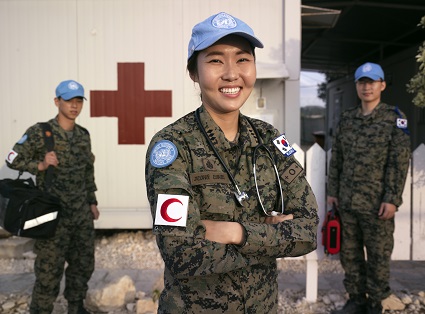
Early warning and rapid deployment
Fourth, we reiterated that effective early warning and rapid deployment are essential to building confidence amongst civilian populations, and to preventing and interrupting escalations of violence.
Fragmentation across the United Nations remains a major impediment for early and effective engagement in peace and security challenges. We urge the UN Secretariat to bring greater coherency across the UN system and to operate as one, to help strengthen early warning, assessment, analysis and situational awareness, including peacekeeping intelligence capacities.
We further encourage the Secretariat to place greater focus on integrated approaches, including planning mechanisms, to support contingency crisis planning. We emphasise that policing is an omponent of UN peacekeeping where mandated, and we therefore underline the critical importance of fully integrating police planning into the overall mission planning process.
Cooperation and partnership amongst the host state, Security Council Members, troop, police, financial and equipment contributing countries, regional organisations, and the UN Secretariat, are fundamental to leveraging these key pledges, as well as to identifying and removing bureaucratic obstacles that continue to impede rapid deployment to and within the field. The development of a roster of military and police units available to deploy from their home country within 60 days is an important step forward.
We continue to acknowledge the critical role played by regional and sub-regional organisations in confronting some of the world’s most difficult peace and security challenges. In particular, we recognise the efforts being made by the African Union and its sub-regional mechanisms to operationalise the Rapid Deployment Capability of the African Standby Force. We appreciate the potential for innovative practices and partnerships to further develop the Force’s operational capability and to enhance the planning capacities of both the AU and the UN.
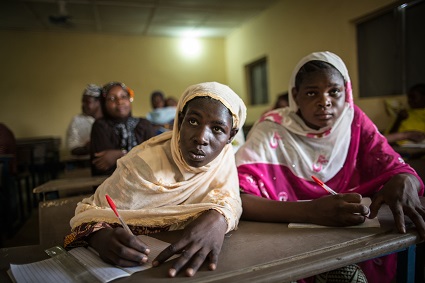
Finally, we note that UN peacekeeping must be ready to respond to a vast array of challenges and that no advantage should be withheld for those working for peace. We therefore encourage the UN to pursue the trial and use of innovative and modern technology in the field, as appropriate and consistent with the basic principles of peacekeeping.
Taken together, and in working differently and better, these efforts will improve UN peacekeeping; building on the strength of our partnerships and common purpose to ensure that UN peacekeeping is fit for purpose in the 21st century.
We recognise this common purpose as the driving force behind our successful discussions at the 2017 UN Peacekeeping Defence Ministerial. We appreciate the support of Member States, regional organisations, and the UN Secretariat in the lead up to the Vancouver Ministerial, including the three preparatory conferences convened in Bangladesh, Japan and Rwanda. We further appreciate the steadfast support of the co-hosts of the Vancouver Ministerial, including Bangladesh, Ethiopia, Indonesia, Japan, Netherlands, Pakistan, Rwanda, United Kingdom, United States and Uruguay.
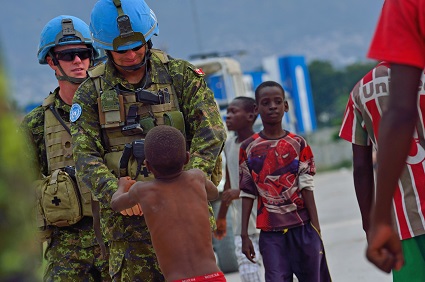
Lastly, we commend the efforts of Member States in advancing their pledges since 2014, and we encourage all Member States to ensure that their pledges are registered in the Peacekeeping Capability Readiness System. We note that pledges made at these high-level conferences are making a difference on the ground, saving lives, and improving UN peacekeeping.
The Vancouver Communiqué has been endorsed by the following Member States: Argentina, Armenia, Australia, Austria, Bangladesh, Belgium, Benin, Bhutan, Brazil, Cambodia, Cameroon, Canada, Chile, China, Colombia, Croatia, Czech Republic, Denmark, Estonia, Ethiopia, Fiji, Finland, France, Gambia, Germany, Ghana, Greece, Guatemala, Hungary, Ireland, Italy, Japan, Kazakhstan, Kenya, Kyrgyzstan, Lithuania, Malaysia, Mexico , Morocco, Nepal, Netherlands, New Zealand, Nigeria, Norway, Pakistan, Peru, Philippines, Poland, Portugal, Republic of Korea, Romania, Rwanda, Senegal, Serbia, Sierra Leone, South Africa, Spain, Sri Lanka, Sweden, Thailand, Uganda, Ukraine, United Republic of Tanzania , United States, United Kingdom, Vietnam, and Zambia.